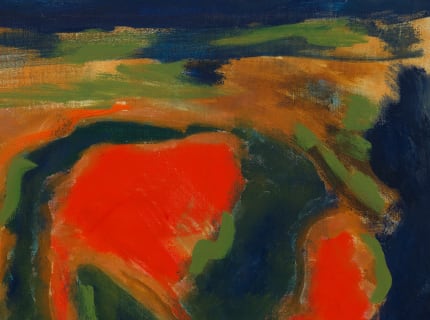Betty Parsons: 1950s Works on Paper
Alexander Gray Associates, Germantown presented Betty Parsons: 1950s Works on Paper, its third exhibition of work by Betty Parsons (1900 – 1982). The Gallery’s presentation highlights a pivotal moment in Parsons’ artistic career after she abandoned figuration to fully embrace abstraction. Comprised of dynamic, intimately scaled works, the exhibition foregrounds what would later become the artist’s signature approach: fortifying the nonrepresentational with the richness of lived experiences, constant travel and exchanges with prominent artists, writers, and curators.
Building on her training as a landscape watercolorist, Parsons’ 1950s works on paper are direct and often urgent interpretations of impressions, places, and times. Rather than making a journal entry or taking a photograph of a particular moment, Parsons was known to open her sketchbook and set gouache to paper as she sought to capture the “sheer energy” of a place. These deft “plein-air” works like Stansford (1951) revel in an animated, playful fluidity that stands in contrast to the considered formalism of the artist’s paintings from this period.
Even after Parsons was able to concentrate more heavily on her painting practice following the construction of her Tony Smith-designed studio in Southold, Long Island in 1960, she remained committed to creating works on paper. On paper, Parsons felt free to challenge the rigid theoretical framework of modernist abstraction with works that are indexical not only insomuch as they’re documents of places, but also of a certain freedom and ease of expression that came while her eponymous gallery in New York was at the height of its success. Her notebooks and sketchbooks reveal the extent of her expressive improvisation, which would ultimately influence her paintings and sculpture.
Gouaches like Untitled (c. early 1950s) offer unique formal arrangements and a keenly melodious sense of color. Meanwhile, the luminosity of Maine (1958) lends a transportive quality that conveys distinct impressions of locales and emotions. In all works, washes of color are built up quickly in thin layers; often the wet gouache is vigorously incised with the back of a brush to further enliven the composition. Active and energetic—like Parsons herself—these works offer a personal connection to one of the seminal figures who shaped twentieth-century art.
Betty Parsons’ work has been the subject of numerous one-person exhibitions at Art Omi, Ghent, NY (2018); The Pollock-Krasner House and Study Center, East Hampton, NY (1992); the Montclair Museum of Art, NJ (1974); Whitechapel Gallery, London, United Kingdom (1968), and The Miami Museum of Modern Art, FL (1963). Parsons’ work is represented in prominent public collections including The Carnegie Museum of Art, Pittsburgh, PA; Guild Hall, East Hampton, NY; The High Museum, Atlanta, GA; The Montclair Museum of Art, Montclair, NJ; The Museum of Modern Art, New York, NY; The National Museum of Women in the Arts, Washington, DC; The Parrish Art Museum, Water Mill, NY; The Smithsonian American Art Museum, Washington, DC; The Whitney Museum of American Art, New York, NY among others.


